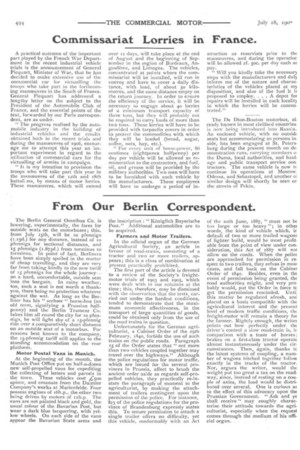Commissariat Lorries in France.
Page 24

If you've noticed an error in this article please click here to report it so we can fix it.
A practical outcome of the important part played by the French War Department in the recent industrial vehicle trials is the announcement of General Picquart, Minister of War, that he has decided to make extensive use of the commercial car for victualling the troops who take part in the forthcoming manoeuvres in the South of France. General Picquart has addressed a lengthy letter on the subject to the President of the Automobile Club of France, and the essential points of the text, forwarded by our Paris correspondent, are as under.
"The progress realised by the automobile industry in the building of industrial vehicles and the results obtained both in the recent trials and during the manoeuvres of 1906, encourage me to attempt this year an important experiment in regard to the utilisation of commercial cars for the victualling of armies in campaign. " It is my intention to provision the troops who will take part this year in the manoeuvres of the 12th and 18th battalims, by means of motor lorries. These manoeuvres, which will extend
over 12 days, will take place at the end of August and the beginning of September in the region of Bordeaux, Angouhlrne, and Limoges. The Vehicles, concentrated at points where the commissariat will be installed, will run in convoy and have to cover a daily distance, with load, of about so kilometres, and the same distance empty on the return journey. In order to ensure the efficiency of the service, it will be necessary to engage about 40 lorries of a minimum transport capacity of three tons, but they will probably not be required to carry loads of more than two tons. These lorries will have to be provided with tarpaulin covers in order to protect the commodities with which they will be loaded (bread, sugar, coffee, oats, hay, etc.).
" For every unit of horse-power, 86 centimes (eightpence halfpenny) per day per vehicle will be allowed as remuneration to the contractors, and fuel, oil, and grease will be provided by the military authorities. Two men will have to be furnished with each vehicle by the manufacturers. These employees will have to undergo a period of in
struction as reservists prior to the manoeuvres, and during the operatiot will be allowed 2f. 5oc. per day each su
Pay
" Will you kindly take the necessary steps with the manufacturers and duly inform me of the nature and characteristics of the vehicles placed at my. disposition, and also of the fuel it is proposed to employ. . . . A depot for repairs will be installed in each locality in which the lorries will be concen• trated.'' --
The De Dion-Bouton motorbus, already known iri most civilised countries, is now being introduced into Russia. An enclosed vehicle, with no outside seats but accommodating 20 persons in. side, has been engaged at St. Petersburg during the present month on demonstration runs, carrying members o the Duina, local authorities, and haulage and public transport service con• tractors. The same vehicle is now ti continue its operations at Moscow: Odessa, and Sebastopol, and another ol similar design will shortly be seen or the streets of Pekin.


























